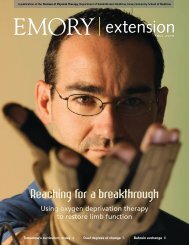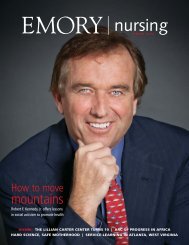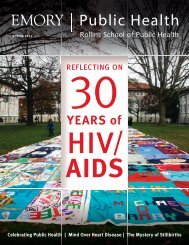returning quality to life - Woodruff Health Sciences Center - Emory ...
returning quality to life - Woodruff Health Sciences Center - Emory ...
returning quality to life - Woodruff Health Sciences Center - Emory ...
Create successful ePaper yourself
Turn your PDF publications into a flip-book with our unique Google optimized e-Paper software.
FEATURE COMFORT AT CRITICAL TIMES<br />
an overall treatment plan, patients tend <strong>to</strong><br />
have less depression and are happier, according<br />
<strong>to</strong> measurements for scale of pain, nausea,<br />
mobility, worry, and other problems.<br />
Dan Herbermann, a Loganville, Ga.,<br />
landscaper and the father of two sons, knows<br />
about that.<br />
Last December he was diagnosed with<br />
stage IV head and neck cancer when an MRI<br />
showed a tumor on the trigeminal nerve,<br />
which spans the side of the face and jaw<br />
and connects <strong>to</strong> the brain stem. Any disruption<br />
of the neuropathways of the<br />
trigeminal nerve can be excruciatingly<br />
painful, and Herbermann has<br />
had his share of pain. He thought<br />
he could endure it until the massive<br />
radiation treatment he was<br />
prescribed—33 visits over seven<br />
weeks—dried out the mucous<br />
glands of his mouth. The cancer<br />
pain and side effects of the treatment<br />
convinced his psychiatrist <strong>to</strong><br />
ask for help from palliative care.<br />
At first, Herbermann was worried<br />
about becoming dependent on<br />
pain-killing drugs, but in conversations<br />
with Jacob he concluded he<br />
needed some form of pain management.<br />
On his first checkup after<br />
the treatment had s<strong>to</strong>pped, doc<strong>to</strong>rs<br />
determined that the tumor had not<br />
progressed. But he knows he may<br />
need more radiation.<br />
His wife, Danya, is certain that<br />
treating the pain made a difference<br />
in her husband’s attitude and<br />
ability <strong>to</strong> keep fighting the cancer.<br />
“He’s in a very hard battle,” she says. “He has<br />
good days and bad. But it would be so much<br />
harder if he didn’t have the help he is getting<br />
from his psychiatrist, Dr. Jacob, and his<br />
oncologist.”<br />
Many oncologists, especially younger<br />
ones, recognize the benefits of palliative care<br />
that come in conjunction with routine treatment<br />
for their patients.<br />
Ruth O’Regan, medical direc<strong>to</strong>r of the<br />
<strong>Emory</strong> Breast <strong>Center</strong> at <strong>Emory</strong>’s Winship<br />
Cancer Institute and a leading breast cancer<br />
6 EMORY HEALTH<br />
researcher, was not surprised that lung cancer<br />
patients who had received palliative care<br />
did better than those who got cancer treatment<br />
alone.<br />
More and more of her patients want <strong>to</strong><br />
discuss <strong>quality</strong>-of-<strong>life</strong> issues when being<br />
treated for advanced stages of the disease, she<br />
says. Oncologists are attuned <strong>to</strong> those needs,<br />
especially in how <strong>to</strong> broach the subject with<br />
patients in their 30s versus older patients<br />
in their 80s. The goals and expectations for<br />
patients can be distinctly different, O’Regan<br />
says. And when oncologists find themselves<br />
caught between the patient and their families<br />
about how aggressively <strong>to</strong> treat the disease,<br />
they want the palliative care team’s help.<br />
“They are a wonderful resource for us, as<br />
well as the patient,” she says.<br />
Transitioning <strong>to</strong> end-of-<strong>life</strong> care<br />
Still, modern medicine has its limits.<br />
Despite advancements, cancer all <strong>to</strong>o often<br />
outlasts chemotherapy and thwarts radiation.<br />
Weakening of the heart and lungs can<br />
trigger a cascade of events that results in<br />
multiple organ failure. The relentlessness of<br />
Alzheimer’s eventually takes out the strongest<br />
of patients.<br />
Moving from palliative care <strong>to</strong> hospice<br />
care is a natural progression. Patients and<br />
their families who have been through the<br />
first often have a better understanding of<br />
what comes next. Hospitals also are learning.<br />
EUH and EUH Mid<strong>to</strong>wn have opened inpatient<br />
hospice units as part of the palliative<br />
care initiative.<br />
For several years, there has been<br />
a hospice care unit in Budd Terrace<br />
skilled nursing facility at <strong>Emory</strong>’s<br />
Wesley Woods <strong>Center</strong>, which specializes<br />
in geriatric care. Chaplain<br />
Woody Spackman and his colleagues<br />
counsel patients and their<br />
families daily on end-of-<strong>life</strong> issues<br />
in the acute long-term care unit at<br />
Wesley Woods and other <strong>Emory</strong><br />
hospitals.<br />
When he worked on the oncology<br />
floors at EUH 25 years ago, palliative<br />
care and hospice care were<br />
rarely discussed. “Some <strong>to</strong>pics just<br />
never came up,” he says. “It was as if<br />
by raising them, we were acknowledging<br />
that we were giving up.”<br />
These days, however, “families<br />
are more in <strong>to</strong>uch with <strong>quality</strong>of-<strong>life</strong><br />
issues. Some of them have<br />
talked at length about it, and they<br />
have reached some decisions,”<br />
Spackman says. Still, many families<br />
need help. And <strong>Emory</strong>’s corps<br />
of chaplains is happy <strong>to</strong> have the<br />
services of palliative care specialists <strong>to</strong> make<br />
available <strong>to</strong> patients and families.<br />
The VA leads the way<br />
Perhaps the most dramatic example of how<br />
things have changed is at the Atlanta VA<br />
Medical <strong>Center</strong>, which has infused $3 million<br />
in staffing <strong>to</strong> expand palliative care and<br />
hospice services for patients. Additionally,<br />
the hospital has recently opened a 12-bed<br />
unit that will serve both services. Patients<br />
will be treated in private rooms large enough
















